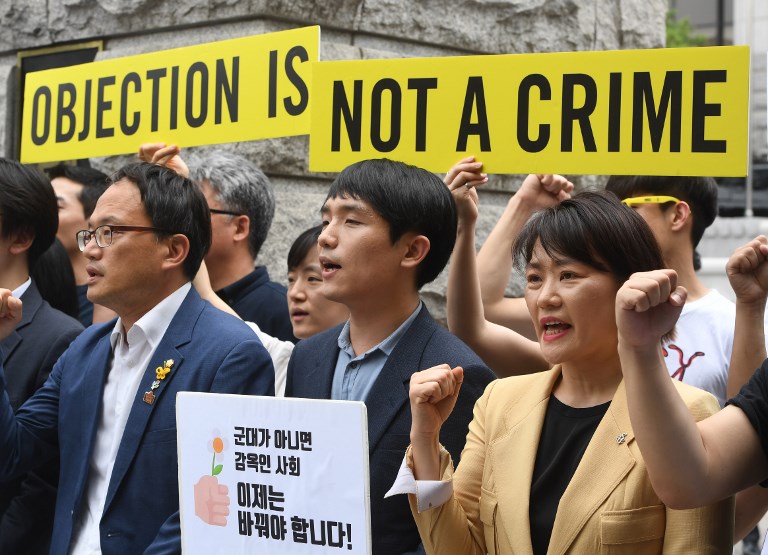

SEOUL, South Korea (AFP) – South Korea’s Constitutional Court on Thursday upheld the jailing of those who evade the country’s military conscription law, but ordered authorities to provide conscientious objectors with an alternative form of national service.
Almost 65 years after the end of the Korean War, nearly every able-bodied South Korean man between the ages of 18 and 35 must still complete around two years of military service.
Anyone refusing the call-up usually ends up in prison for 18 months, and with no alternative community service option around 19,000 conscientious objectors have been jailed since 1950, most of them Jehovah’s Witnesses.
In a split decision, the court’s nine judges upheld a provision in the current conscription law under which draft dodgers can be punished with up to three years in prison.
“It is legitimate to enforce military duty through criminal punishment,” the court said in its decision.
But it ruled that another phrase in the conscription law that does not recognise any alternative to military service is in breach of the constitution.
In a statement, the defence ministry said that it had been considering alternatives to military service, and “will decide on a policy at the earliest possible date in line with the Court decision”.
Among those that greeted the decision were Jehovah’s Witnesses, who have long opposed conscription.
“Today’s Constitutional Court decision is a historic breakthrough for the rights of conscientious objectors in South Korea,” David A. Semonian, international spokesman for Jehovah’s Witnesses at their world headquarters in New York, said in a statement.
“When the Government, as ordered by the Constitutional Court, adopts a law on alternative civilian service, the rights of conscientious objectors in Korea will truly be protected,” he added.
The faith said some 19,300 Jehovah’s Witnesses in South Korea had served a total of 36,000 years in prison since the end of the Korean War in 1953.
South Korea’s armed forces rely heavily on conscription, and military service often involves postings to front-line positions on the border with North Korea.
In May 2010, a North Korean submarine torpedoed the South Korean naval vessel Cheonan, killing 46 sailors including 16 who were on military service.
In November the same year, the North shelled a South Korean border island, killing two marines — both of them young conscripts.
But tensions with Pyongyang have drastically eased this year, with the North scaling back confrontation over its nuclear arsenal and holding summits with the South and the US, and calls for alternative forms of service have been on the rise.
In several previous cases the country’s top courts have backed conscription, but Thursday’s verdict followed appeals from 28 objectors against the law, who cited the freedom of conscience guaranteed in the constitution.
Some 200 objectors are currently serving prison terms and 883 others have cases pending at various levels in the legal system — a number which has grown rapidly in recent months as judges delayed decisions, waiting for the Constitutional Court to rule.
© Agence France-Presse
